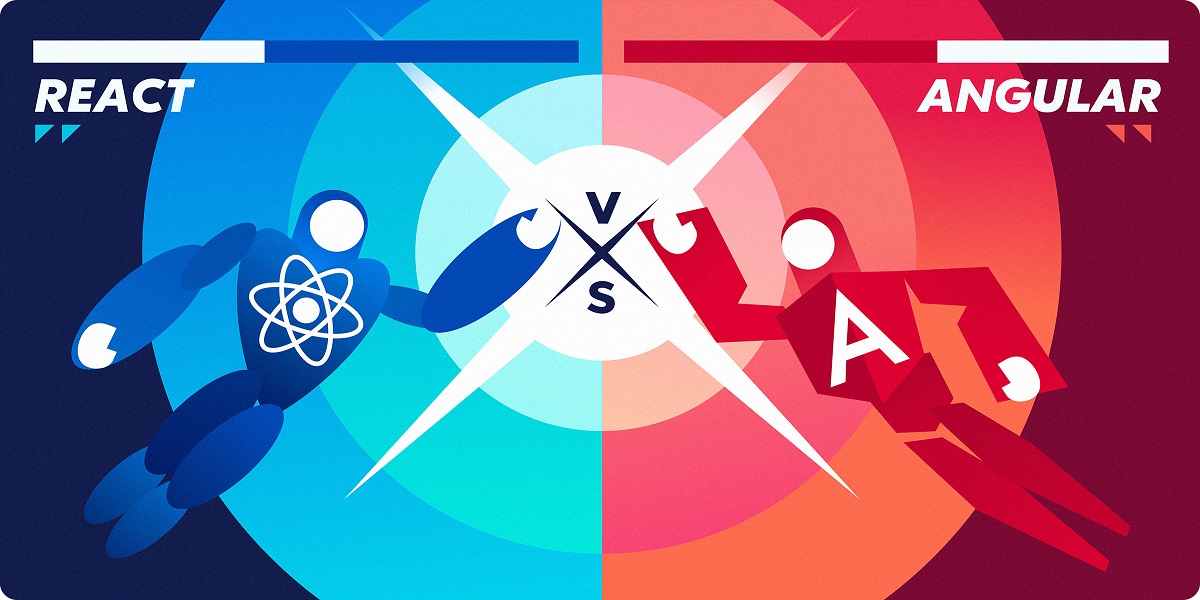React vs Angular: Which Technology Should You Use?
- By Abdul Basit
- 29-06-2022
- Technology

Technology continues to evolve. Go back to the time when web development only required the knowledge of HTML, CSS, and PHP, and you were all set to create your own website. But it took a fair amount of time to complete a single website.
However, today, we have multiple web technologies; each of them has its own perks. Of course, they have fastened up the web development process and made it more organized. Two of the modern web technologies are React and Angular.
Both technologies have their pros and cons. One can easily get confused when to use which one, especially when you have only recently learned the two.
In this article, I’m going to shed some light on the features of both, and which technology is better than the other. So without further ado, let’s get down to business.
Angular
Google developed and launched Angular as a client-side framework back in 2009. It’s open-source, which means it’s completely free and allows developers to make changes in the existing resources as per their needs. Lots of developers use Angular for creating single-page web applications, which are supposed to be lightweight and fast.
Since it’s a Google product, it enjoys immense support at all levels from the developers' community. Angular features and supports various libraries that facilitate HTML better.
Pros of Angular
Web developers prefer Angular because of the following benefits:
Angular features an easy-to-customize DOM that makes a developer’s job straightforward and easy.
You have plenty of libraries at your disposal to create custom templates.
The dozens of templates you have used in the past can be used in future projects as well.
It takes little time to develop websites using Angular -- thanks to its built-in injection subsystem.
Angular allows you to test your code with 100 percent accuracy, you can test each and every unit separately.
You get single-user routing and the opportunity to build reusable components for future use.
Cons of Angular
Like every web technology, Angular, too, has some cons:
Developers often report performance-related issues with the DOM.
Its libraries are tricky to implement, you will need support from the Angular community at some point.
Integration with a third party is not straightforward like React.
Though testing is quite detailed, debugging can be strenuous for you.
Some embedding and interactive elements can affect the page speed.
React
Like Angular, React is also an open-source framework. React was developed and launched by social media giant Facebook in 2013. The developers' community uses React as an alternative to Angular for creating single-page web applications. You can also create mobile applications using React.
Unlike Angular, React is not limited to web applications. Since it has many features and libraries that support mobile app development, a developer with a strong grip on React can work in both domains.
Pros of React
Here are the top benefits of using React:
Code reusability is the biggest benefit of React, you can use pre-developed elements in future projects as well.
React’s architecture lets you import components into an existing design and minimize the efforts required to create a User Experience.
React features libraries that ensure the high performance of an application.
It’s easier to get knowledge on API at any stage of the development process.
One can update code fast -- thanks to top-notch front-end and server-side support.
With interactive and dynamic server-side rendering, you can easily develop an isomorphic web application.
React is compatible with both Android and iOS.
React is a view-oriented framework, so as a developer you get a clear view of the application.
Cons of React
React has a few small cons including:
The learning curve for developers can be a little steep as compared to Angular.
As compared to Angular, React is more of a library, not a complete framework.
Constant changes in the architecture require you to be on your toes to research and learn new updates on a regular basis.
Incorporating it into MVC requires configurations.
Which Technology Should You Choose?
The latest versions of both frameworks are quite impressive and on par with each other. As a web development company in USA, we use both technologies in different scenarios.
However, if you still want to know which one is a step ahead of the other, it’s React. The first reason is its huge user base. You will never find yourself stuck at one point, unable to find any solution. Someone from the community will come to your rescue.
Besides that, this user base will shorten the learning curve and make it more exciting -- in case you are still an amateur.
React’s code reusability and pre-developed elements cut down the development time to a significant extent. You can import components in the existing design and improve the User Interface.
Compared to Angular, React is quite straightforward and easy to use. As a developer, you’d want to eliminate all the complexities of the project and make the whole process streamlined -- this is why React is being preferred by developers.
And in the end, it all comes down to your preferences. Both frameworks rely on JavaScript, so they are quite similar in many ways -- If you feel more comfortable working with Angular over React, then it’s your choice.


.jpg)
.jpg)
.jpg)
